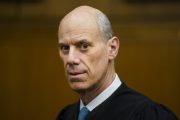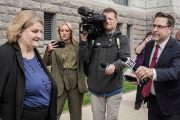
The apparent coverup of Jeffrey Epstein’s powerful clients by the Trump administration continues. On Tuesday, Federal Bureau of Investigation (FBI) Director Kash Patel appeared before the Senate Judiciary Committee in a hearing dedicated to oversight of the bureau’s leadership, recent personnel decisions, and responses to high-profile cases — including the assassination of activist Charlie Kirk. And, perhaps not surprisingly, Patel found himself yet again questioned on the flashpoint case that refuses to fade: Epstein and the fate of his alleged associates.
The uncomfortable questions on the matter came from Senator John Kennedy (R-La.).
Kennedy asked:
You’ve seen most of the files. Who, if anyone, did Epstein traffic these young women to, besides himself?
Patel replied:
Himself. There is no credible information. None. If there were, I would bring the case yesterday that he trafficked to other individuals. And the information we have, again, is limited.
Kennedy followed up: “So, the answer is no one?” Patel stressed, “For the information that we have.”
The statement erased years of sworn victim testimony, official filings, and investigative reporting. With one answer, Patel presented Epstein’s operation as the work of a solitary predator. The suggestion that all the flights, all the parties, and all the names amounted to nothing was almost comical in its boldness.
Shifting the Blame
So why is the FBI’s information so “limited”? Patel pointed back to the original Epstein case nearly 20 years ago. He said evidence from that probe was tied up in protective court orders.
Patel called the “original sin” the way U.S. Attorney Alex Acosta handled the case in 2006. Acosta’s team, he said, relied on “a very limited search warrant or set of search warrants,” covering only 1997 to 2001 and 2002 to 2005. “It didn’t take as much investigatory material as it should’ve seized,” he told the senators.
That narrow start, Patel argued, led to the 2008 plea deal (a non-prosecution agreement, or NPA). Epstein avoided federal charges, pleaded to state counts, and walked away with what looked like a wrist slap. The deal came with protective orders “legally prohibiting anyone from ever seeing that material ever again without the permission of the court.” And, he added, it “barred future prosecutions for those involved at that time.” Yet not a single senator pressed Patel on the obvious point: Those measures may have sealed evidence from that era, but they did not apply to new material uncovered years later.
And that is the fatal flaw in Patel’s defense. Protective orders and NPAs may restrict disclosure, but they are not permanent shackles. Courts can revisit them. Prosecutors can challenge them. Congress can demand access. Acosta’s actions were reckless and damaging, but they do not absolve the FBI’s new leadership — including Patel — of responsibility. In 2019, then-Attorney General William Barr’s Department of Justice had fresh evidence in hand. The bureau could have pursued new leads and reopened old ones, or petitioned to unseal material that might expose other perpetrators. Patel himself could have pressed prosecutors to act on the evidence seized in New York. Instead, he now presents the failures of 2006 as if they permanently chained the FBI.
Evidence in New York
If Acosta’s conduct was the “original sin,” what explains the FBI’s failure to act on what agents uncovered more than a decade later? In July 2019, after Epstein’s arrest, the FBI raided his Manhattan townhouse.
Court documents and public reports describe compact discs locked in a safe, with handwritten labels such as “young [name] + [name]” and “Misc nudes 1.” At Ghislaine Maxwell’s trial, an FBI agent testified about black binders stuffed with explicit materials. Each was neatly organized and marked with names, and contained images of nude or semi-nude girls. These were not rumors. They were physical items, photographed and entered into court.
Patel now insists Epstein acted alone, but the labels tell another story. They suggest connections, records, perhaps even leverage over others. The bureau has never explained why this material has not produced prosecutions or even acknowledgment.
By all indications, this was not evidence tied up in Acosta’s 2008 plea deal. It was gathered under fresh warrants in 2019.
If Patel is telling the truth and there is no “credible evidence,” then, apparently, the FBI opened a safe, pulled out binders of discs labeled with names, viewed sexual images, and decided none of it mattered. If Patel is not telling the truth — and the labeled discs and victim testimonies all suggest this — then his bureau has chosen not to act.
Either way, Patel’s claim collapses under the very record the FBI’s own agents created.
The Voices of the Survivors
The material seized in New York seems damning enough. But the most powerful evidence has always come from the survivors themselves.
The late Virginia Giuffre testified under oath that Epstein trafficked her to powerful men. She described being flown to his island and directed to serve his associates. Other women have told similar stories, recounting how they were shuttled between locations and handed off like property. These accounts shaped civil suits, informed indictments, and helped convict Epstein’s closest associate, Ghislaine Maxwell.
Two weeks ago, survivors spoke again — this time on Capitol Hill, at a gathering organized by Reps. Thomas Massie (R-Ky.) and Ro Khanna (D-Calif.). Several made clear that Epstein was not the only predator. One of the victims, Annie Farmer, said that “Epstein and his associates [harmed] hundreds — if not thousands — of other girls and young women.” Women spoke of “perpetrators,” “powerful figures,” and “others” involved in abuses.
These accounts directly contradict Patel’s claim. Survivors have said again and again that Epstein did not act alone. For Patel to dismiss all of them with a single phrase — “no credible evidence” — is legally dubious at best.
No Clients
There is also strong circumstantial evidence pointing to the network around Epstein. His “black book” listed hundreds of high-profile contacts. Flight logs from the “Lolita Express” showed a revolving door of powerful passengers.
Attorney General Pam Bondi added to this picture in May when she said investigators were reviewing “tens of thousands of videos” of Epstein “with children or child pornography.” It is hard to believe Epstein was the only abuser on those tapes. If even a fraction implicate others, Patel’s “no credible evidence” line collapses instantly.
Patel’s testimony signaled what many already suspected: Just as it happened during Trump’s first term, the bureau will not pursue the names that matter.
Indeed, back in July, the FBI issued a memo that left little room for doubt:
An exhaustive review of investigative holdings relating to Jeffrey Epstein … revealed no incriminating “client list.” There was also no credible evidence found that Epstein blackmailed prominent individuals as part of his actions. We did not uncover evidence that could predicate an investigation against uncharged third parties.
The bureau also reaffirmed its conclusion that Epstein died by suicide, and said it would not “perpetuate unfounded theories about” him. Finally, it said that no further disclosures would be made.





